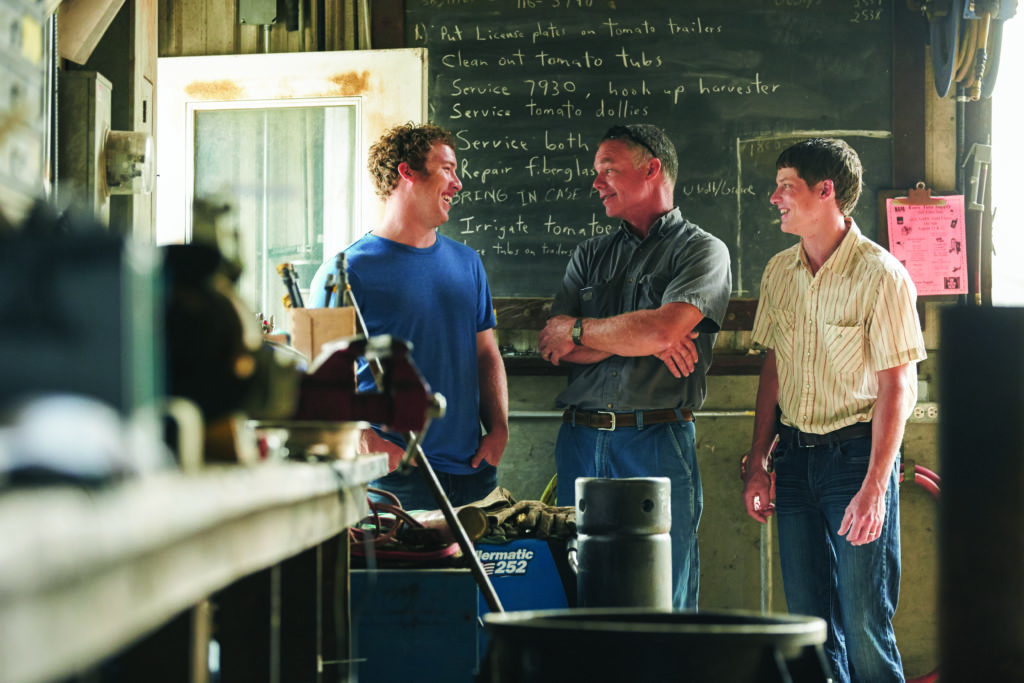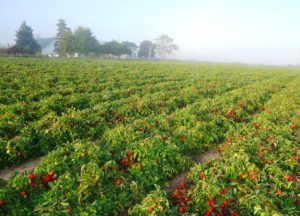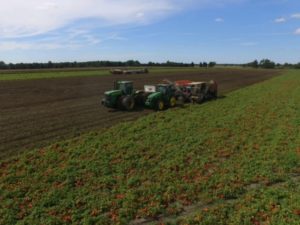
Jul 3, 2018Rice family recognized for excellence in tomato production technology
The Rice family has farmed near Wanatah, Indiana for more than a century across six generations. While tomatoes are a relatively new crop for them — the first planted in 1983 — the family has quickly become known for their success with tomato production technology, which has helped them earn national recognition.
Today, Rice Farms manages about 2,400 acres, with tomatoes making up less than 10% of the total. Most acreage is planted with seed corn for Remington, commercial corn, and soybeans. Yet their skill with tomato production recently earned them national recognition. In 2017, Red Gold named Rice Farms its Tomato Grower of the Year, selected from among 48 growers and seven master growers.
Building a lasting partnership
The Rice family entered tomato production growing for Heinz and began supplying Red Gold in 1987. Since then, the family has signed 32 consecutive annual contracts with the company.

“It’s a long-term relationship,” said Scott Rice, the farm’s fourth-generation grower. His sons, James and David, now co-own the farm with him.
Red Gold remains deeply rooted in the Midwest, sourcing tomatoes from family farms across Indiana, southern Michigan, and northwest Ohio. The processor cans whole peeled tomatoes along with purees, salsas, ketchups, and diced tomato products.
Advancing with modern tomato production technology
Technology drives efficiency at Rice Farms. Both planting and harvesting are managed by GPS, which ensures straighter rows and simplifies field work. Transplanting begins each May and continues for six weeks, with harvesting starting in mid-August.
“The goal is providing tomatoes every day for 50 – 55 days,” Scott Rice explained.

Modern mechanical harvesters highlight the advancements in tomato production technology. Capable of processing 30 – 40 tons per hour, the machines complete a full day’s work in six hours. Optical sensors distinguish between ripe and green tomatoes, kicking unripe fruit back into the field.
“Our labor needs have dropped down to very, very minimal,” Rice said. Contract labor supports peak planing and harvest, while family members shift responsibilities during tomato season. “I transition wholly into tomatoes during harvest time,” said David Rice.
Growing high-quality tomatoes
Each year, Red Gold growers plant several varieties of Roma-like tomatoes that are small, firm, and rich in solids — ideal for processing. In 2017, Rice Farms produced enough tomatoes to fill more than 16 million cans of Red Gold products.
For growers, “peeler” tomatoes destined for whole, diced, or stewed cans are especially valuable, paying 20% more than fruit destined for sauces and ketchup.
Brand loyalty and shared success

Although contracts renew annually, Scott Rice remains committed to Red Gold. “We love the Red Gold company,” he said. “They have been good for growers. They’re great for midwestern agriculture.”
Founded in 1942, Red Gold has stayed family-owned through four generations of the Reichart family. With three processing facilities in Indiana and a million-square-foot distribution center, it has become the nation’s largest privately owned tomato processor.
“They’re a wonderful family to work for,” said James Rice. “It’s a true midwest success story.”
Scott Rice agreed, noting Red Gold’s conservative approach. “They’re down to earth,” he said. “They’re not simply in the business of buying the cheapest tomato they can buy.”
– Stephen Kloosterman, VGN Assistant Editor
















